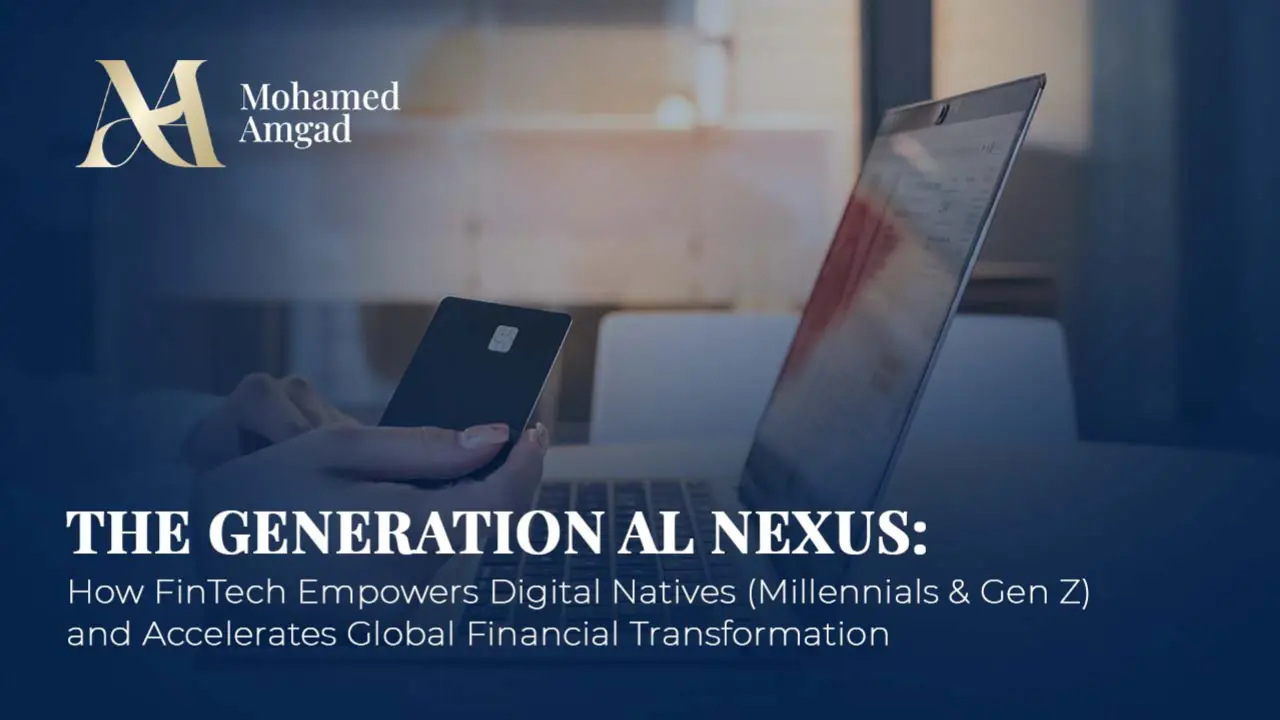Introduction: A New Era of Finance Shaped by Digital Natives
The world of finance is evolving faster than ever — and the real disruptors aren’t just tech companies, they’re people. Specifically, Millennials and Gen Z, who have grown up in a world where every transaction, conversation, and connection happens online.
In his research, Dr. Mohamed Amgad Mousa calls this the “Generational Nexus” — the meeting point between technological innovation (FinTech) and generational adoption. This convergence is redefining not only how we bank but also what banking means.
Understanding FinTech’s Role in Global Transformation
From Banking Halls to Mobile Apps
Traditional banks once symbolized financial power — long queues, paperwork, and waiting days for simple transfers. FinTech, short for Financial Technology, has flipped that script. Today, money moves with a tap.
Apps like Revolut, PayPal, and Chime have turned smartphones into full-fledged banks, offering instant payments, savings, and investments — anytime, anywhere.
Why FinTech is More Than Just Technology
As Dr. Mousa’s research notes, FinTech isn’t just a tech upgrade — it’s a social and cultural revolution. It bridges technology with behavioral change, creating systems that reflect what modern users value most: speed, transparency, and ethical choice.
Millennials and Gen Z: The Digital Drivers of Change
What Makes Digital Natives Different?
Millennials (born 1981–1996) and Gen Z (born after 1996) are the first generations raised in a fully connected digital world. For them, banking through apps feels more natural than walking into a branch.
They value instant access, personalization, and ethical finance over loyalty to old brands. According to studies cited by Dr. Mousa, over 75% of Millennials use their phones for financial transactions compared to only 30% of Baby Boomers.
Trusting Technology Over Institutions
Unlike their parents, younger consumers trust technology more than institutions. They prefer systems where transparency replaces bureaucracy and data replaces paperwork.
FinTech’s transparency — powered by blockchain, digital IDs, and open APIs — gives them the confidence to manage their own money.
The Five Pillars of FinTech Value
1. Financial Inclusion for All
FinTech is breaking barriers for millions who were once excluded from traditional banking. Through mobile wallets, micro-lending, and digital identity, people in developing countries can now access financial services securely and affordably.
“Inclusion is not just access — it’s empowerment,” writes Dr. Mousa.
2. Speed and Convenience in Everyday Banking
Neobanks like Monzo and Revolut let users open accounts in minutes. Real-time payments and AI-driven tools mean money management happens instantly — a non-negotiable for digital natives.
3. Financial Literacy and Empowerment
Apps like Robinhood and Acorns gamify investing, teaching young users to save and trade confidently. FinTech is turning complex finance into accessible learning.
4. Transparency and Digital Trust
Blockchain technology ensures every transaction is traceable and secure, removing the “trust gap” that once plagued financial institutions.
5. Ethical and Sustainable Finance
Gen Z wants their money to mean something. FinTech platforms now offer carbon tracking, ESG portfolios, and green banking, aligning profit with purpose.
How FinTech is Redefining the Banking Industry
Digital Transformation in Action
FinTech has forced banks to modernize — from paper-heavy systems to data-driven ecosystems. According to Dr. Mousa’s findings, 85% of leading banks have moved core processes to the cloud for efficiency and scalability.
The Rise of Open Banking and API Economies
Open Banking, first pioneered in the EU, allows consumers to share data securely with third parties to unlock better financial products. For younger users, this means freedom of choice and personalized experiences.
Regulatory Technology (RegTech) and Accountability
RegTech tools now help banks monitor compliance, prevent fraud, and report in real-time — ensuring innovation doesn’t compromise safety.
Challenges and Opportunities Ahead
Balancing Innovation with Regulation
While FinTech encourages innovation, it also raises concerns about data privacy and security. Governments worldwide are developing sandbox frameworks to allow safe experimentation without risking consumer protection.
The Cybersecurity and Data Privacy Dilemma
As Dr. Mousa highlights, 70% of digital consumers fear data breaches. Banks and FinTechs must implement “security by design” to protect user trust.
Avoiding Digital Inequality and Bias
AI-driven systems must be carefully audited to prevent algorithmic bias and ensure fairness in credit scoring and lending.
The Future: AI, DeFi, and Beyond
AI-Driven Personalization and Risk Management
Artificial Intelligence now powers everything from fraud detection to personalized budgeting. It’s turning banking from a transactional service into a predictive, proactive experience.
DeFi, Metaverse Banking, and Global Inclusion
Decentralized Finance (DeFi) and Metaverse-based financial spaces are reshaping how we perceive money. Tomorrow’s consumers may attend virtual bank meetings in the metaverse or trade digital assets seamlessly across borders.
Key Takeaways from Dr. Mohamed Amgad Mousa’s Research
FinTech as a Cultural, Not Just Technological, Revolution
FinTech’s impact mirrors the values of the generations using it — inclusion, ethics, and personalization. It’s a movement where finance becomes human-centered and values-driven.
Policy and Institutional Recommendations
Dr. Mousa recommends stronger regulatory harmonization, public-private collaboration, and ethical governance frameworks to sustain innovation responsibly.
Conclusion: The FinTech Generation Is Just Getting Started
Dr. Mousa’s research makes one thing clear: FinTech is not just changing finance — it’s changing generations. Millennials and Gen Z aren’t adapting to financial systems; they’re reinventing them.
As technology and humanity merge, the financial world of tomorrow will be faster, fairer, and far more inclusive.
- Date: October 13, 2025
- Categories: Links
- Download PDF PDF

